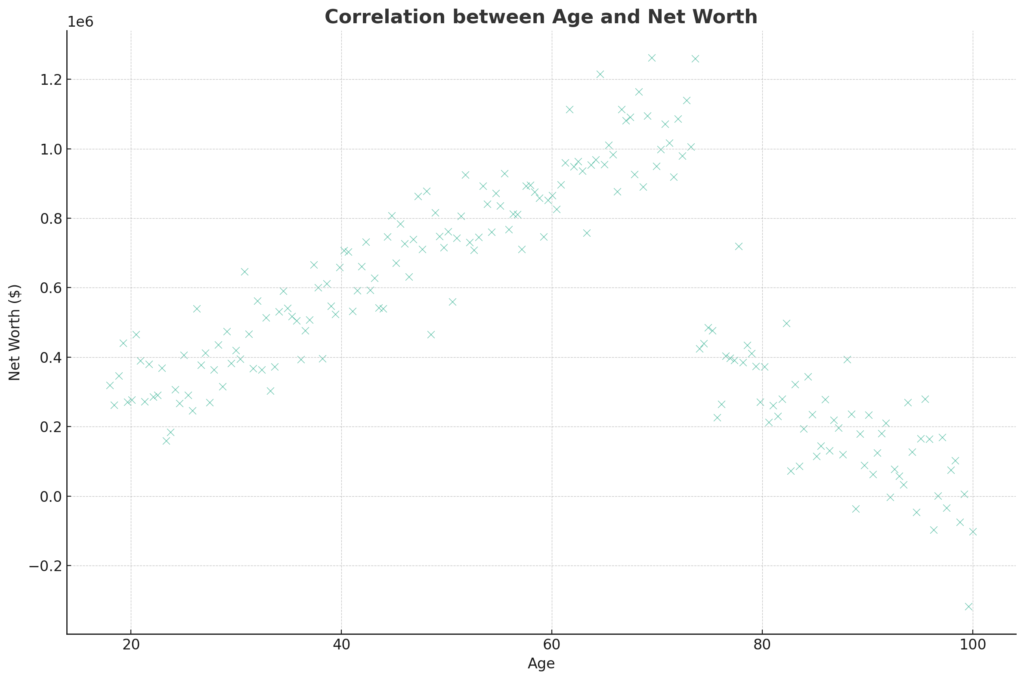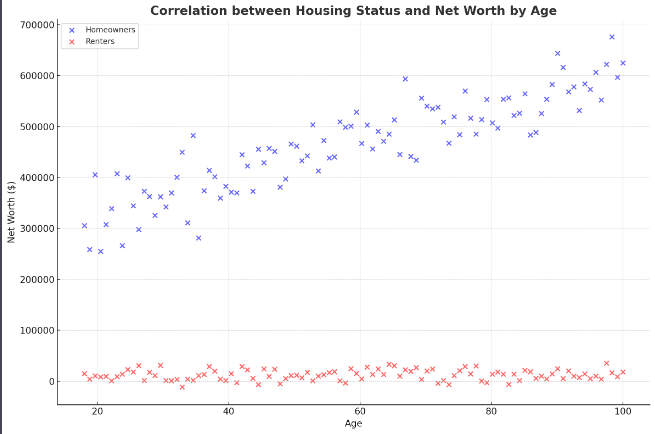Ever wondered how your financial standing compares to others in your age group? Are you curious about the secrets behind wealth distribution across different generations? In this blog post, we’ll dive into the world of “net worth percentile by age”, shedding light on the factors that influence wealth and giving you insights on how to improve your financial health. Get ready to uncover the wealth distribution secrets!
Key Takeaways
Net worth percentiles provide insight into wealth distribution across different age groups and can be used to evaluate financial health.
Education, career progression, investments and housing status all influence net worth by age.
Monitoring net worth progress using tools such as Empower or Mint can help make informed decisions for long-term financial success.
Table of Contents
- Analyzing the Most Recent Data on Net Worth Percentiles by Age
- Factors Influencing Net Worth by Age
- How Housing Status Affects Net Worth by Age
- The Importance of Financial Health and Net Worth
- Strategies for Increasing Net Worth Across Age Groups
- Tools for Tracking Your Net Worth Progress
- Debunking Common Myths About Net Worth and Wealth Distribution
- Summary
- Frequently Asked Questions
Understanding Net Worth Percentiles

Net worth serves as a powerful indicator of an individual’s financial standing, calculated by subtracting their liabilities, such as student loan debt, from their assets. Assets may include funds in savings or investments, as well as the value of real estate such as a house or vehicle, while liabilities may include credit card debt, loans, or a mortgage. Using a net worth calculator can help you determine your financial health with ease.
Understanding the difference between average and median net worth is key to grasping the distribution of wealth. While average net worth is often influenced by outliers, median net worth, which includes median net housing value, is the midpoint at which half of the households are above and half are below.
Analyzing net worth percentiles sheds light on the wealth distribution across different age groups, offering valuable context for assessing and comparing our own financial health.
Analyzing the Most Recent Data on Net Worth Percentiles by Age

The most recent data on net worth percentiles by age, such as those released by the Federal Reserve, provide an overview of the median and average net worth figures for various age brackets. Net worth percentiles encompass an age range of 18 to 100, based on wealth data collected from various sources. The overall median for households in the U.S. is $121,700, and the average American net worth as of 2019 is $748,800.
Studies have indicated that net worth generally increases as Americans age, with a pattern of rising net worth to age 65-74 followed by a decline afterwards. Households in the top 10% have multiple millions as they near retirement. This trend highlights the importance of understanding and managing one’s financial health across different life stages.
Factors Influencing Net Worth by Age

Several factors influence net worth by age, including education, career progression, and investments. These elements significantly shape an individual’s financial standing and readiness for the future. Recognizing how each factor influences wealth accumulation aids in making informed decisions to enhance your financial health.
The subsequent subsections explore the roles of education, career progression, and investments in shaping net worth across different age groups. Understanding these factors better can help pinpoint focus areas and develop strategies to grow your net worth over time, regardless of your age group.
Education and Net Worth
Higher levels of education are positively correlated with higher net worth. For instance, considering Americans net worth:
Americans with college degrees have an average net worth of approximately $1.52 million
Americans with a high school diploma have an average net worth of $305,200
Individuals with a Master’s degree have an average net worth of approximately $2.5 million
Individuals with a Bachelor’s degree have an average net worth of around $2.1 million
This trend is even more pronounced when comparing individuals with Master’s degrees to those with Bachelor’s degrees.
These figures underscore how investing in education can significantly enhance your net worth. While it’s true that individual financial journeys are unique, higher education levels generally lead to higher income potential and, in turn, increased wealth accumulation.
Career Progression and Wealth Accumulation
Career progression and salary growth play a significant role in wealth accumulation. As individuals advance in their careers and earn higher salaries, they have more opportunities to save, invest, and pay off debt, all of which contribute to increased net worth. Additionally, certain professions, such as anesthesiologists, surgeons, and investment bankers, are known for significant wealth accumulation.
The job sector also impacts wealth accumulation and net worth. Sectors such as finance, technology, and healthcare, which often offer higher salaries, can allow individuals to accumulate wealth at a faster rate. Meanwhile, sectors with lower salaries or limited growth potential may result in slower wealth accumulation.
In the end, personal factors like education, experience, and financial management significantly influence wealth accumulation and net worth.
Investments and Financial Growth
Investments significantly contribute to increasing net worth across various age groups. As individuals invest and accumulate assets, their net worth tends to increase over time. Some of the most prevalent types of investments that contribute to increased net worth include:
Stocks
Bonds
Mutual funds
ETFs
Real estate
Retirement accounts
Long-term investments can have a positive effect on net worth by increasing the value of assets over time. Such investments can lead to compounding returns and capital appreciation when held for an extended period. As a result, individuals may experience an increase in their overall net worth in the long run.
How Housing Status Affects Net Worth by Age

Housing status, such as homeownership or renting, can significantly impact household net worth by age. Homeownership is generally associated with higher net worth, as homeowners gain equity in their homes over time, which contributes to their wealth. In contrast, renters do not have the opportunity to build equity via homeownership. The median net worth of homeowners is $255,000, while renters have a net worth of only $6,300.
Grasping how housing status impacts net worth aids in making informed decisions about your living arrangements. While homeownership is not the only factor in determining net worth, it is a significant contributor to overall wealth accumulation.
The Importance of Financial Health and Net Worth

Financial health and net worth act as key indicators of financial well-being and enduring stability for consumer finances. Tracking your net worth over time allows you to monitor your financial progress, identify areas of strength and weakness, and make informed decisions to improve your financial health.
A healthy net worth reflects a solid foundation for future financial stability, enabling you to weather unexpected challenges and pursue your financial goals. By understanding the factors influencing net worth by age, you can take proactive steps to enhance your financial health and secure a brighter financial future.
Strategies for Increasing Net Worth Across Age Groups

Adopting customized strategies that address your unique financial situation and goals is crucial for increasing your net worth. Some practical strategies for increasing net worth across age groups include focusing on debt management, boosting savings, and making smart investments.
Debt management involves consolidating debts, paying off high-interest debts first (the debt avalanche approach), and avoiding new debt whenever possible. Saving more money and investing in assets that appreciate over time, such as stocks, bonds, or real estate, can also contribute to growing your net worth. By implementing these strategies, you can steadily work towards increasing your net worth and achieving your financial goals.
Tools for Tracking Your Net Worth Progress

Various tools and resources can aid in effectively monitoring your net worth progress, helping you stay on track and maintain your financial health. When selecting a net worth tracking tool, consider features such as:
Comprehensive personal finance software
Visualization capabilities
Budgeting tools
Automation for easy tracking
Compatibility with different devices
Customized financial tracking
Forecasting tools
Several cost-free tools are available for tracking your net worth, such as:
Empower
PocketSmith
Mint
YNAB
Utilizing these tools to regularly update and monitor your net worth progress can help you make informed financial decisions and stay focused on achieving your financial goals.
Debunking Common Myths About Net Worth and Wealth Distribution

Misconceptions about wealth distribution can hinder your pursuit of financial success. For instance, some people believe that wealth is primarily determined by luck or privilege rather than hard work and skill, leading to discouragement and a lack of motivation to save and invest. Others may think that wealth is easily attainable, resulting in unrealistic expectations and a lack of focus on long-term financial planning.
Having a realistic grasp of wealth distribution and the factors contributing to financial success is crucial in setting and achieving meaningful financial goals. By debunking common myths about net worth and wealth distribution, you can focus on personal financial goals and make informed decisions to enhance your financial health.
Summary
Understanding net worth percentiles by age is key to unlocking the secrets of wealth distribution and improving your financial health. By examining factors such as education, career progression, and investments, you can gain valuable insights into how to increase your net worth over time. Armed with this knowledge, you can take control of your financial future and work towards achieving your financial goals. Remember, the key to financial success lies in understanding your unique financial situation and taking proactive steps to enhance your net worth, one step at a time.
Frequently Asked Questions
What should your net worth be by age?
By age, your net worth should be comparable to the average American’s. Specifically, by 35 years old it should be around $45,000, at 45 it should reach about $124,000, and by 55 it should be close to $187,000.
What is the top 5% net worth?
The top 5% of the United States population has a net worth of just over $1 million, while the top 2% have a net worth of around $2.4 million.
How much net worth is the top 10%?
The top 10% of the wealthiest Americans have a net worth of $1,219,126. There are approximately 15 million millionaire households in the U.S., making up 11% of the population and representing the upper class of income earners.
What net worth is 95th percentile usa?
The 95th percentile of US households have a net worth of $3.2 million, making them considered wealthy with more spending power and possibly multiple homes.
What is the general trend of net worth as individuals age?
As individuals age, their net worth tends to increase until reaching a peak between ages 65 and 74, before gradually declining.


